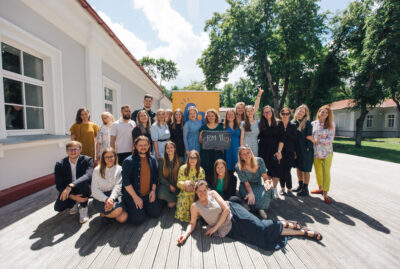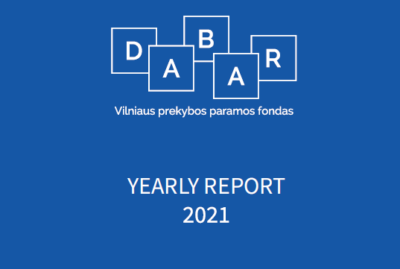A jury of professional economists elected the winners of the National Economics Exam. The best ones were awarded cheques worth EUR 500 and other prizes. In total, nine participants, who demonstrated their proficiency, were awarded. As many as 11,000 people decided to take part in the online exam during the quarantine. The exam was organised by the Lithuanian Free Market Institute (LFMI) in cooperation with the Lithuanian National Television and Radio (LRT) for the third time. The organisers said they noticed that the interest in economics had been growing.
The winner in the category of citizen was Ričardas Gaurys from Vilnius. The economist who works in the European Commission representation office in Lithuania said he would donate the prize he won to the support foundation for minimizing the effects of COVID-19.
“Some questions were rather tricky; you had to think carefully; there were some questions where you needed a calculator. I will definitely take part in the exam next year as well. It is an excellent initiative. It is necessary to encourage people to take interest in economics so that they could make better decisions both in their personal and public life and at work,” the winner of the citizen category of the National Economics Exam said.
The second award in the category of citizen was given to a finance analyst Agnė Getautienė from Kaunas; and the third award – to a lecturer Janina Šeputienė from Šiauliai. The winner in the category of schoolchildren was announced to be Armandas Kondroška, a pupil of Šiauliai Didždvaris gymnasium; the second prize was awarded to Mantas Anskaitis from Alytus, and the third – to Anna Krasuckytė from Vilnius.
A student who showed the greatest proficiency in economics was Justas Janonis from Alytus. He studies applied economics at Harvard University in the USA. The second prize in this category was awarded to Augustas Mačijauskas, a first-year student at the University of Manchester, and the third prize – to Andrius Minelga from the Lithuanian University of Health Sciences.
Interestingly, the most active participants of the exam come from Sūduva Gymnasium in Marijampolė for the third year in a row. Even during quarantine, 198 schoolchildren from this school took part in the exam.
“My students do not earn high grades for participation in the exam; so I am delighted that they wanted to verify their knowledge even during their holiday; some teachers also took part in the exam. Questions were quite difficult but interesting”, Rasa Tumosienė, a teacher of the school, said.
The participants answered slightly more than half of the questions correctly, on average. There were 12 participants who made no mistakes. The best results were demonstrated in the category of citizen. On a 10-point grading scale, on average, results of the participants in this category could be given a seven, whereas schoolchildren demonstrated poorer results – they would be given a five. Participants of the exam, which could be taken all day long, had to answer 30 test questions and one open-ended question – they had to evaluate the impact of coronavirus and the effects of its management on the economy and the impact of the amount of a minimum monthly wage on the potentials of job creation.
“The results show that people know the main principles and laws of economics quite well; for instance, they know why the first yield of strawberries is always the most expensive and how the supply of rapeseeds will change if their price rises. There were more difficulties when the participants had to identify the effects of economic policy or to answer how GDP is calculated,” Marija Vyšniauskaitė, head of the Educational Centre of the Lithuanian Free Market Institute, noted.
The National Economics Exam is organised by the Lithuanian Free Market Institute and Lithuanian National Television and Radio (LRT). The main sponsor of the exam is Vilnius Commerce Support Foundation Dabar (Now), other sponsors are Danske Bank, ACM, JCdecaux. The questions for the exam were created by a group of partners: universities, the Bank of Lithuania, the Ministry of Finance, the State Tax Inspectorate, educative organisations and teachers of economics. The role of patron for this project is fulfilled by the Ministry of Education, Science and Sports.
“The National Economics Exam is a perfect opportunity to check your knowledge in economics and to gain new knowledge. We are glad that the interest in this educational initiative grows annually. The initiative saw a record number of participants this year: among the participants were both schoolchildren and persons who completed their education a long time ago. Quarantine has certainly influenced the number of participants – people are looking for various activities, in particular, for activities by doing which they spend their time meaningfully. On the other hand, as we go through tough times, we have to recalculate our income and expenses, so financial literacy becomes particularly relevant to most of us. Participation in the exam, its theoretical and practical questions have definitely given some new necessary knowledge,” Monika Garbačiauskaitė-Budrienė, director of the national broadcaster LRT and one of the project organisers, said.






